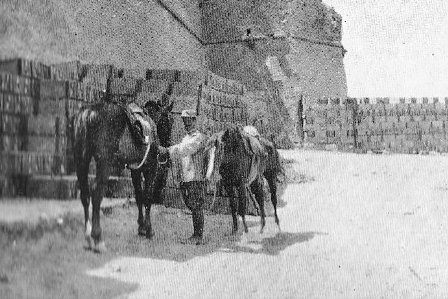16 June 1915
HELLES - The Turkish shells could arrive in a flash with little or no warning. Medical Officer Joseph Vassall, 6th Colonial Regiment, Brigade Coloniale, 1st Division, CEO, had a close escape of 16 June when he stopped for a moment to watch a Zouave working party.
 Photograph: Jospeh Vassell next to ammunition dump by Sedd el Bahr fort.
Photograph: Jospeh Vassell next to ammunition dump by Sedd el Bahr fort.
"I make my daily round, see my patients and later proceed to the hut of the secretaries of the division. I was there about 8.30. Some nine or ten soldiers, Zouaves, and police, are working in a big sand excavation about 3 yards long by 6 or 8 yards long. The whole is covered by logs and canvas, which makes a roof about the height of a man, except in the centre, where it is raised high to a point. Just at the moment when I was standing holding out a paper to my corporal secretary Saboul a crash was heard. It was very sudden. A 77mm shell burst in the middle of us, just at the height of the hut, on the left towards the sea. It spat out all its bullets, which were scattered all around in a wave of 4 or 5 yards. The case of the shell passed over my head through the opening of my tent, tearing the canvas on one side and burying itself deeply in the earth behind. I might have been decapitated. The canvas all around my head was perforated with pieces of shrapnel, any one of which was sufficient to kill me. A wooden post a short distance in front of me stopped a certain number of bullets. The tent shows a hundred holes. What did I feel? Opposite me, separated only by a table, I saw a man staggering and another to my right whose face was bleeding profusely. He rushed out, and I followed him. I saw in going out two inert bodies. I concentrated my mind on stopping the haemorrhage of the man I had followed. I succeeded, but not without difficulty. A doctor ran to help me and I called for stretcher-bearers and carriages. After having stopped the bleeding of this man, I turned to another wounded soldier. Pieces of shrapnel had passed through the chest, the shoulder and the left arm. I raised, revived and bandaged him. He was very courageous, and did not complain, but asked after his comrades. The third had been caught in the hip by a splinter which had penetrated the abdomen, and another piece had grazed his head. He talked, but a fatal pallor came slowly over him. The fourth was killed instantly. There were still two more. I will not go into details - four are dead. I did not really feel any shock until I reconstructed the scene in my mind after the departure of the victims. I realised what had happened and what might have happened, it gave me rather a shock, though I have seen and lived through much since 25th of April."
"SOURCE:
Joseph Vassall, Uncensored Letters from the Dardanelles, (London, Heinemann, 1916), pp.131-132 (Edited)
